“Openness, Inclusion, Equality. For a Better Society”
I asked her for a simple conversation, an interview to reveal the work that she is doing, without entering into specific details. Stefania Giannini – the Minister of Education, Universities, and Research since February 2014 – accepted with enthusiasm.
She was born in Lucca, studied at the University of Pisa and University of Pavia, taught as a professor of glottology and linguistics, and became chancellor of the University for Foreigners of Perugia. Those who live abroad may be particularly interested to know that she was a member of the Ministry of Foreign Affairs’ national commission for the promotion of the Italian culture abroad.
I met with the Minister, in the guest room of the Italian General Consulate, during a break in the course of her recent trip to New York.
First, I asked her to “introduce herself” to our readers. This is how she did it:
“Professionally, I am a linguist. Since I was young, I have been interested in classic culture, the relationship between languages and places, and their development in the history of western culture. I was chancellor of an important and prestigious university with a strong international duty, and in that position, up until a few years ago, I was very involved in relationship between the United States and Italy.”
What are the fundamental principles of your reform efforts as Minister?
“I believe that now more than ever the key words of the education and school systems–as well as society as a whole–are openness, inclusion, and equality. Through my political action, inspired by what I would call a liberal vision of the world, I’m trying to affirm these principles. I fought for school reform, which was highly debated; maybe some of that echoed here, at least in Italian-American communities that are interested in our country. I am proud that, after its approval, we are enacting those principles. Those are the key words for a better society, more than egalitarianism or merit.”
Your visit in America is brief but extensive. Can you describe it for us?
“It’s my first trip as Minister, but it’s not my first institutional trip. In the previous positions that I was speaking about with you, I had many opportunities to visit this country and to be involved directly in bettering the Americans’ knowledge of the Italian language and culture. Now I’m here with two specific goals.
The first is in Washington, and it’s participating in an important international conference on Arctic research. It’s a topic that Italy knows extremely well, from the CNR (Consiglio Nazionale di Ricerca) to the other sectors of the Italian academy that are physically involved in those areas. Next year Italy will host the G7 Summit; this is an important step.
Then, in order to associate this trip with other institutions, I thought about accepting Boston’s invite to MIT and New York’s invite. It was my desire to be in contact directly with an environment made of innovations, young people, research, digital ventures, and to measure the potential for greater collaboration with both with us and with our system.
You also met many young Italians with successful startups and measured what the government is doing for them in these sectors. This opened a truthful discussion about the critical situation that we have in Italy.
I had a very packed day in New York. First, I went to the Italian Academy for Advanced Studies at Columbia University, an institution that I have known well from prior years. Next I went to Fordham University to assist – as the minister – with an agreement between Fordham and a group of Italian universities that are performing well in America. Finally, I visited NYU’s Casa Italiana Zerilli-Marimò to discuss reforms with the director, Stefano Albertini. December 4th [the date of the referendum on the constitutional reform, n.d.r.] represents an important day both for Italy and for Europe. Those of us involved in the government believe that the reaction will be positive, and it will allow us to proceed with changes that we deem necessary.
Let’s talk about the Italian presence abroad, mainly regarding the world of research. A term is sometimes used in Italy, a term that I find absurd, in part because of how it sounds: “cervelli in fuga” ‘the brain drain.’
“It’s definitely an outdated term at this point.”
How about intellectual mobility? A circular mobility that brings Italians to America and Americans to Italy. It’s a constantly changing world. What are the new borders? How can we attract both Italian and foreign students and experts to Italy? What is the government doing, and what would it like to do?
“We have a very clear idea that we can be summed up very simply, as you’re asking me to do. Up until a few years ago many countries were playing games and competing over the possession of raw materials and the presence of big businesses able to stimulate industry. Today, they’re also playing the game regarding the attractiveness of each country to talented individuals. Human capital is a fundamental factor.
Today we need educational systems that teach us to learn, and to learn more. We need an environment of innovation that attracts young people and attracts, not those who are running away, but those who are moving around.
The government is very aware of this, and we already began to implement some very specific measures. I’ll give you two examples.
An international call is opening to scholars and researchers, both young and old alike. These individuals do not need to be Italian; they can be current residents in Italy, or they could be residents of another country.They will all be people that set the bar high in regards to their merits and their scientific excellence. In the coming months we will be introducing 500 positions for both full professors and associate professors.
But this will not be enough if there are no top-down operations that target specific areas of the country, concentrate on specific subjects, have a strategic financial plan from the government, and that give life to – what we in Europe call – research infrastructure. That is, systems with high concentrations of businesses, research centers, and universities that work on the same projects.
We’re doing it in Milan. It’s an important project, and it’s called “Human Technopole” because it will combine computer science, genomics, and biomedical work on diseases that affect the aging population. An aging society is one of the biggest global challenges, affecting more than just the western world. One billion Euros were publically invested in ten years, and there’s a great outlook for also attracting private resources. We’re expecting to create 1600 research and scholar jobs here for academics who view Milan as others already see Boston: a beautiful, attractive, and sustainable place for research, a city one would choose to live in.
All in all these are two simple actions, but they also break an Italian inclination of trying to distribute a little to everyone, to finance as much as possible no matter how small, as to not displease anyone.”
Those who live in New York know that many young researchers leave the south especially, where we have a big infrastructure problem. Funds for research are scarce, and working outside academia is difficult. However, many people say that staying in it is even harder.
“I was talking about Milan because it’s an area post-Expo. Milan objectively has a fertile and fertilizable area. On October 6th together with the University of Napoli Federico II, we will launch an important center for Apple in Naples in the ex area of Bagnoli. I will personally be there. It’s an investment that Apple spontaneously made without special request. They chose Naples because it’s a vibrant, intellectual city and because there are important universities that form the ecosystem of the higher education. It’s an example of how this is happening in places other than the north.
I’ll tell you sincerely, talking about a “southern question” in the university, in a global society such as ours, where we need to push for a higher quality all over the country, seems like an old topic to me. There must be other solutions.
We need to make sure that in both northern and southern Italy there are opportunities for all those young people who see their future in scientific research. It will definitely be great when and if a student from Milan decides to move to Palermo to study a subject that perhaps isn’t as developed in Milan or in Turin. Or maybe instead of Paris, or Berlin, or New York, he chooses an Italian city.
But from my point of view, it’s the national system that needs to be made effective. Often in the south – I don’t think I’m saying anything too controversial – it’s not the university system that’s weak; it’s the social, political, and cultural infrastructure that create the most difficulty for establishment, for life, and for quality of life. And these are other things the government is working on.
In short, I don’t feel I can say the south has a disadvantage in the field of academics. It suffers here from the same problems it has in other fields; therefore, a wide-scale treatment needs to be done, not just one focused on universities.
Let’s enter into the heart of your work. Can you tell us how schools are changing alongside the university system right now?
“Schools need to change in general, not only in Italy, because there are no longer educational certainties that existed in the last century. A school that doesn’t teach a continuous way of learning and doesn’t change its teaching and learning model is a school that’s destined to be the caboose of the train and not the locomotive of society. School, by definition, is the locomotive of society.
Thanks to large investments in the construction of schools and laboratories, Italy is innovating both its teaching methods and the places where teaching is done. The “Buona Scuola” law introduces standards that, until now, were absent in the world of Italian schools. Frankly, some reforms were not very well accepted, like the evaluation system. I’m the seventh minister that’s tried to introduce them, and the first the succeeded in doing so, despite the reaction of one part of the scholastic world – not of everyone, but of a loud, cohesive, and strongly union-supported group – which was very prohibiting. But I continue to believe that this new method of evaluation is right because if a system is not able to self-evaluate and to be evaluated, it’s hard to see what’s working well and what’s not working. It’s imperitive to introduce modifications that not only transform the weak points into strong points but also further reinforce the strong points.
All this is important, especially in a country that, as the Arabs said, is too long and therefore has enormous differences between the cities and the outskirts, or longitudinally, between the extreme south and the extreme north.
Therefore, we have evaluation, merit, and scholastic autonomy, which is another magic word that we recovered from Italian tradition and that used to be part of Italy’s genetic code. Let’s not forget that Italy is Maria Montessori’s country; it’s not the country of fat bureaucrats behind a desk. Nevertheless, an education system that never opened itself to innovation has frozen this great scholastic tradition.”
Bringing the schools up to speed, not only with the times, but also with real life, is one of the most difficult challenges. However, this is in fact, what Maria Montessori did.
“Absolutely. And with a lot of work, we have surpassed yet another taboo here, the combination of school and work. This integration consists of students gaining experience in business or cultural institutions during the three-year period of high school. Last year it became mandatory for all students in technical schools, professional schools, and high schools. A million and a half students will be involved in the courses over the next three years. This means we are breaking the notion of “First you study, then you put into practice what you studied.”
This is a very “American” approach…
“I’ll tell you of something that happened in the United States in the first professional development course that I held for Italian teachers here at Queens College. It was for Italian teachers and American teachers that teach Italian. I taught an applied linguistics lesson, and it seemed that the teachers really appreciated it. However, one of these very nice teachers sent me a card and wrote something like “Oh, Stefania, wonderful lecture, everything was great, but if you want to catch the heart of Americans you must be more pragmatic.”
I had done a great lesson on theory, but the approach was the same one that we use in Italy: I will give you the principles, and I will also give you the rules. Certainly this is the product of an extraordinary European culture, and I don’t believe we should dismantle it, but that’s a whole other argument. There are other approaches out there, and this is what makes intellectuals that are in Boston, New York, or at Michigan University so strong.”
Taking school outside of school and universities outside of universities is definitely a great challenge…
“And so is bringing the outside world into the schools. It’s significant, and I believe it’s of upmost importance.”
Let’s discuss the Italian language. As a professor of Glottology and Linguistics, you’re not a bureaucrat-minister that faces problems from behind your desk. Why do you think the Italian language in the world, starting with the United States, is important? What can the Italian language mean for a foreigner?
“For now a promise: to know and to learn a language that’s not your native language is not only a way to communicate for work, but it’s also a unique and incredible way to lead people to another vision of the world. With Italian this vision of the world matches with a country that is a giant in terms of humanistic culture of the western world. This is an objective statistic; we didn’t discover it, and it remains largely unknown. Clearly, it has a unique and incredible richness for a person that comes from other cultural and linguistic experiences.
I wish that we could reinforce the results that we had in the United States over the past 10-15 years of work: the insertion of Italian as a language for the Advanced Placement Program in colleges and the possibility of Italian as a major or specialization. This is possible thanks to two factors: one of them is in our hands, and the other is in their hands.
The responsibility in our hands is to continue to support the promotion of the Italian language and to continue to finance it as much as possible. We also have to modify the old teaching methods; now we will teach the language as part of a project of cultural promotion. From my knowledge of this country, the language & culture pairing should be inverted in order of importance, that is culture & language.
Americans’ cultural interests inspire them, and that then becomes linguistic competence. In America this is more common than the opposite, which is what happens in other countries.”
This is the guiding principle behind our work at i-Italy! First presenting our culture in English, then inviting our readers to study Italian. It’s impossible to reach an American simply by saying, “study Italian.”
“No doubt! This is our duty, and it needs to continue this way, with clarity of mind.
There’s also another thing that Americans need to do. I feel they’re making several cuts, not only Italian, but also other foreign languages in the Humanities departments of important universities. This is a cultural-political choice that I feel is very dangerous. If a country that is rigidly monolingual closes its doors at a time when being as open as possible is necessary, it needs to be aware of the consequences that will result for the next generations.”
History teaches this subject in America. Many generations of Italian Americans lost their original language, “obligated” by society to integrate and speak only English.
“This doesn’t only apply to Italian; it was a policy regarding all languages. Therefore, we will do what we need to do, but we are also calling for a bit of courage and responsibility on their part because it’s as if they are stealing from the cultural endowment left for their children and grandchildren."
Is there anything that you think is important, that you want to say, and that I didn’t already ask you?
“In general, to the United States, to the Italians who are here, but also to those interested in our country… I think that today the connection between Europe and America, specifically between Italy and America, is very strong. There is a high-conductivity steel thread of scientific and cultural diplomacy that links us. Therefore, it’s of extreme importance to continuously invest in these partnerships, in these contacts, and to focus ourselves on more than just our output for the next day and for the next year, even if it’s scientific output. It’s a great idea to invest in innovation — provided it is understood as it should, as technology transfer, as the creation of start-ups — and it should always be accompanied by a growing sensibility for the broader cultural dimension of innovation."
At the beginning I asked you to present yourself to the readers. Behind a minister, a person that has an institutional duty, there’s always a person with her own story. We often forget about this because speaking about institutions makes the individual person seem distant. You’re also a woman and a mother. What crosses your mind first thing in the morning when you wake up and begin your duty as Minister?
“That’s one heck of a question! I don’t deny that my first thoughts are always related to what I’m expecting that day (which is fitting for a person with such a gigantic responsibility) so I can manage it as well as possible. But personally I have a particularly strong attention to the “sentimental” side of life: kids and love. And I always reflect on the fact that for a career woman – in Italy mainly, but perhaps also here from what I see – the price to pay is still extremely high. I wish that for the next generations (she said with a smile directed at Consuls Isabella Periotto and Chiara Saulle, who were present at the time of the conversation) there coud be some lighter thoughts for a change.”






























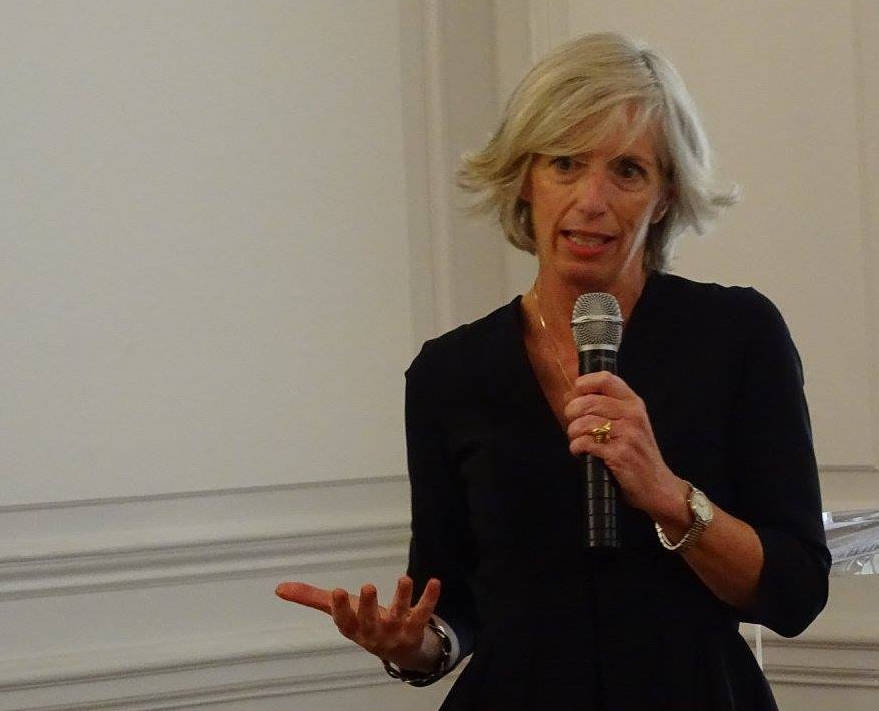
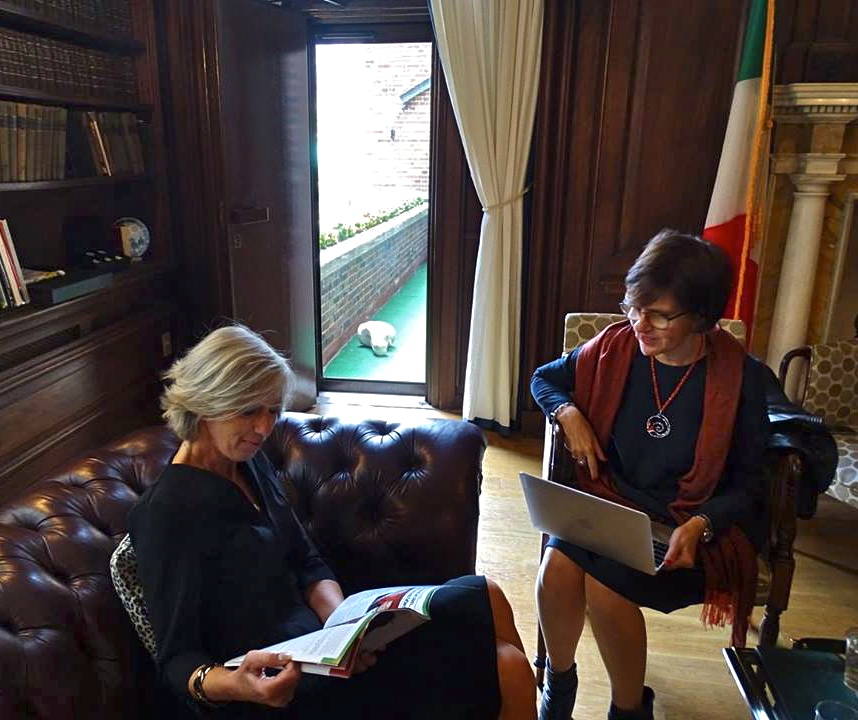
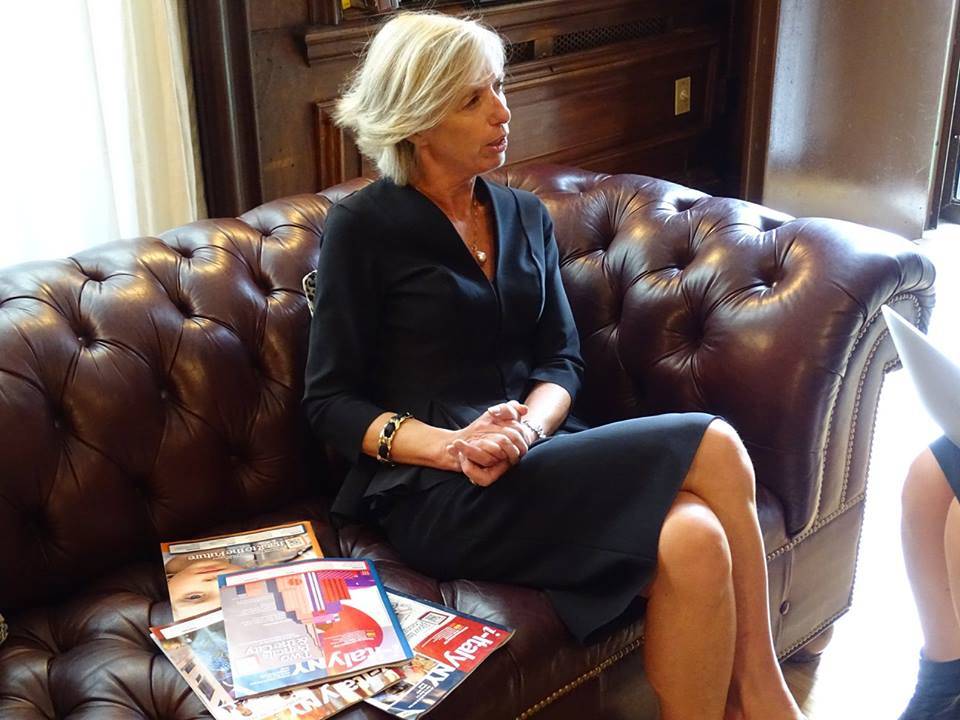
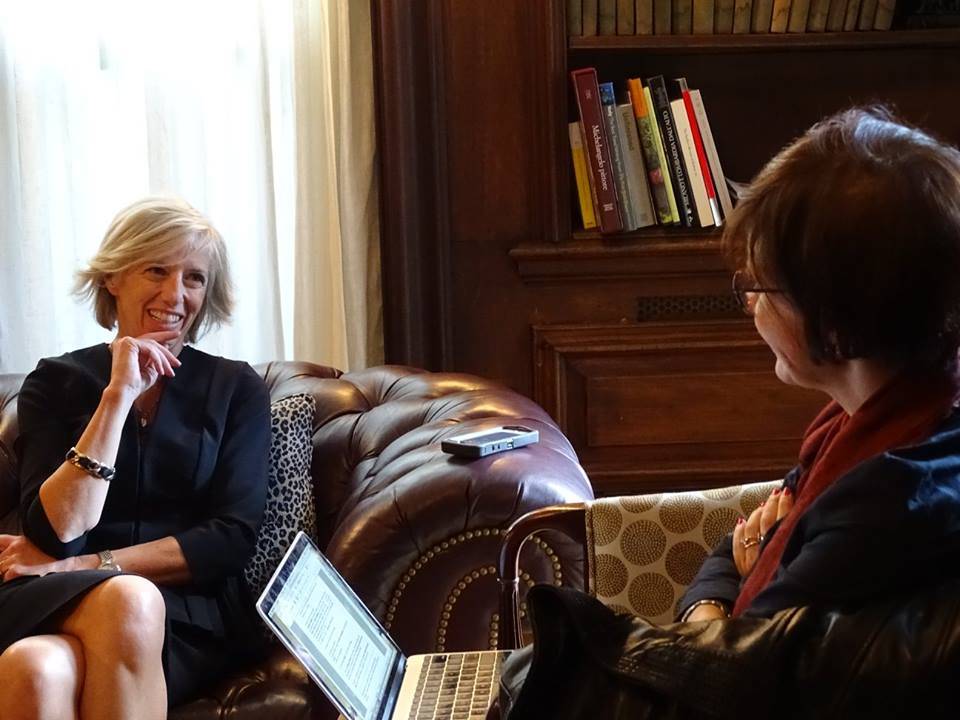
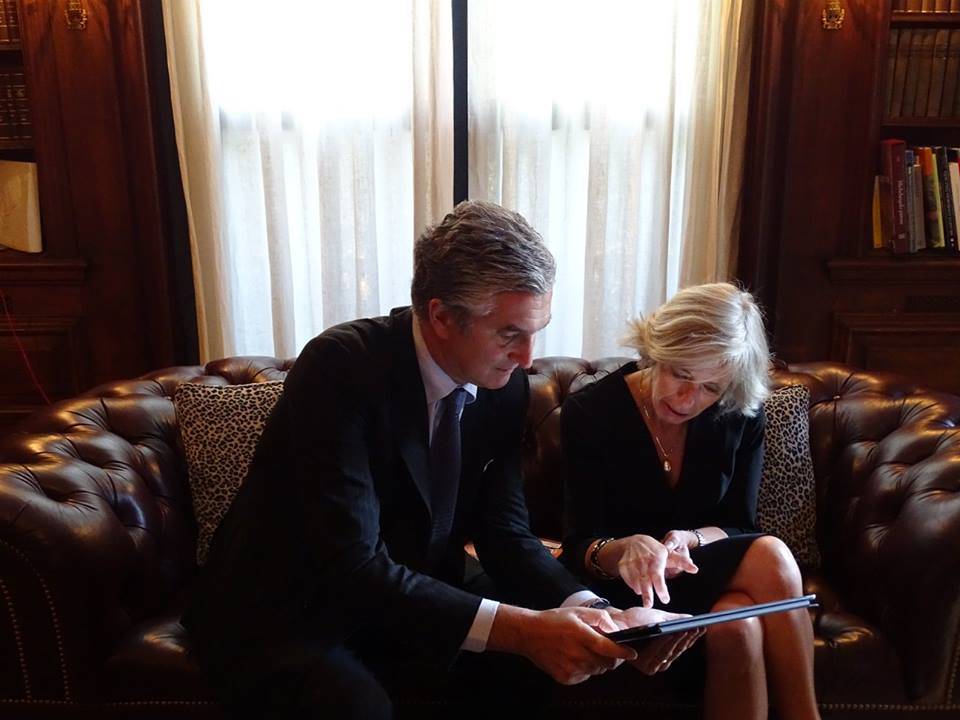
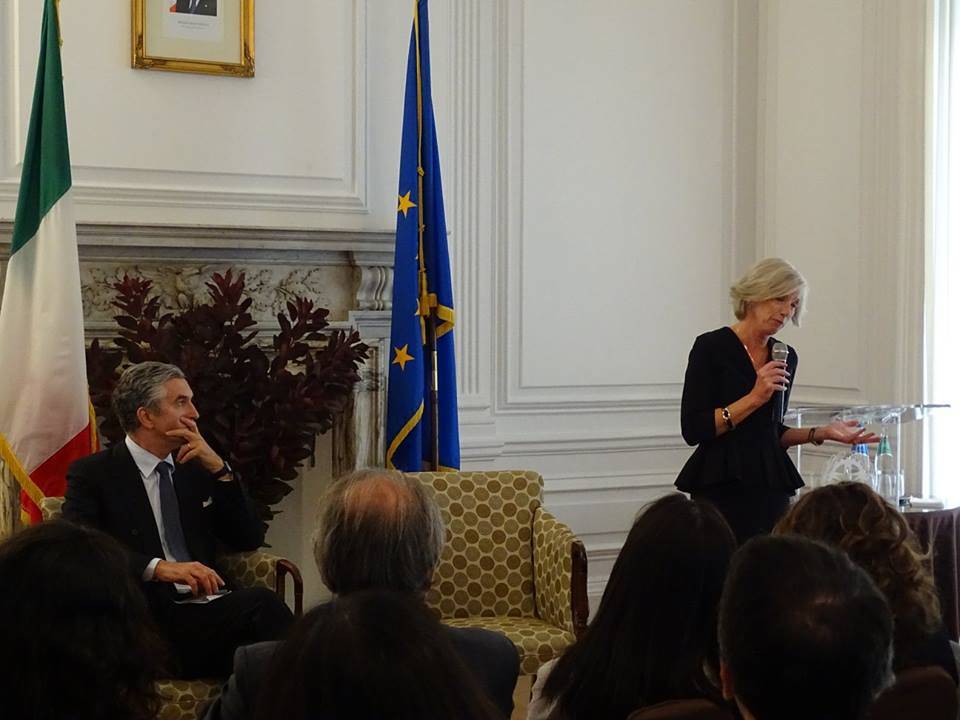
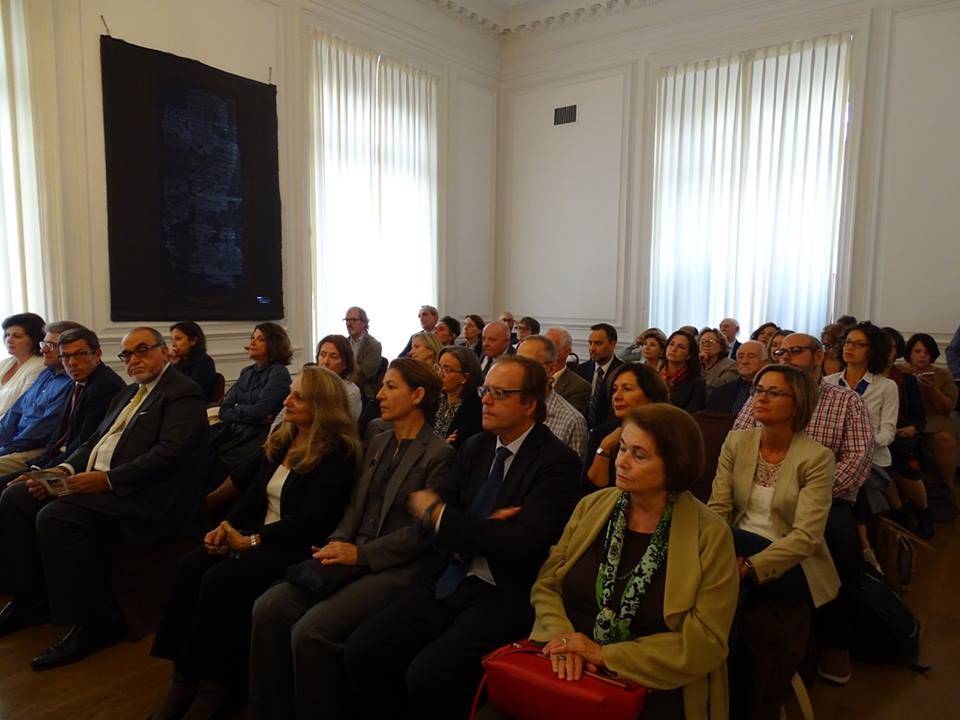
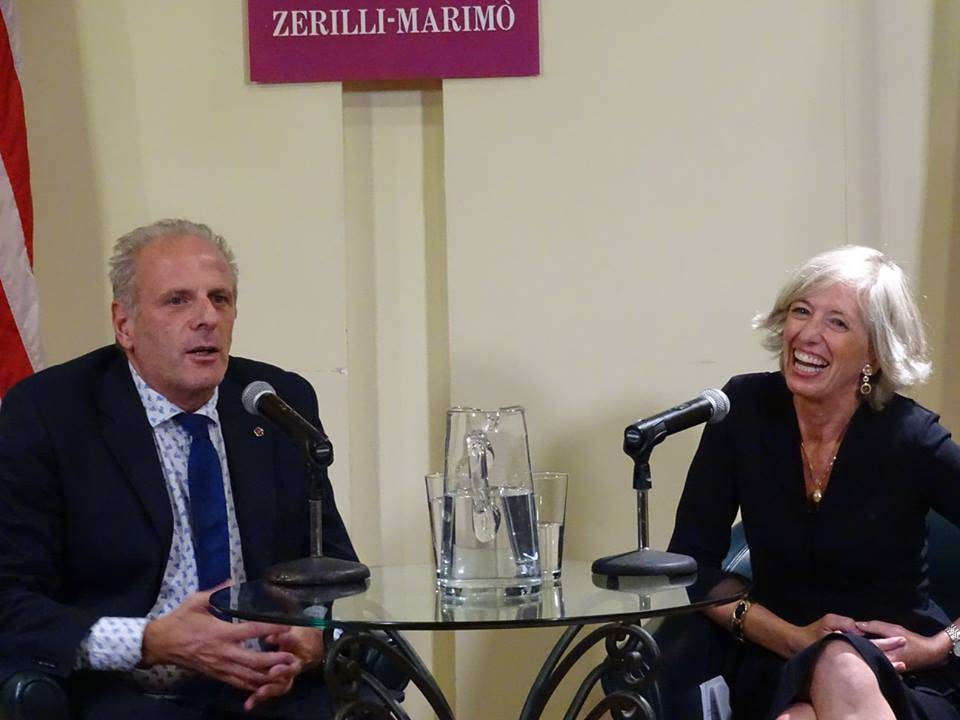







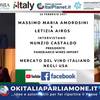
i-Italy
Facebook
Google+
This work may not be reproduced, in whole or in part, without prior written permission.
Questo lavoro non può essere riprodotto, in tutto o in parte, senza permesso scritto.